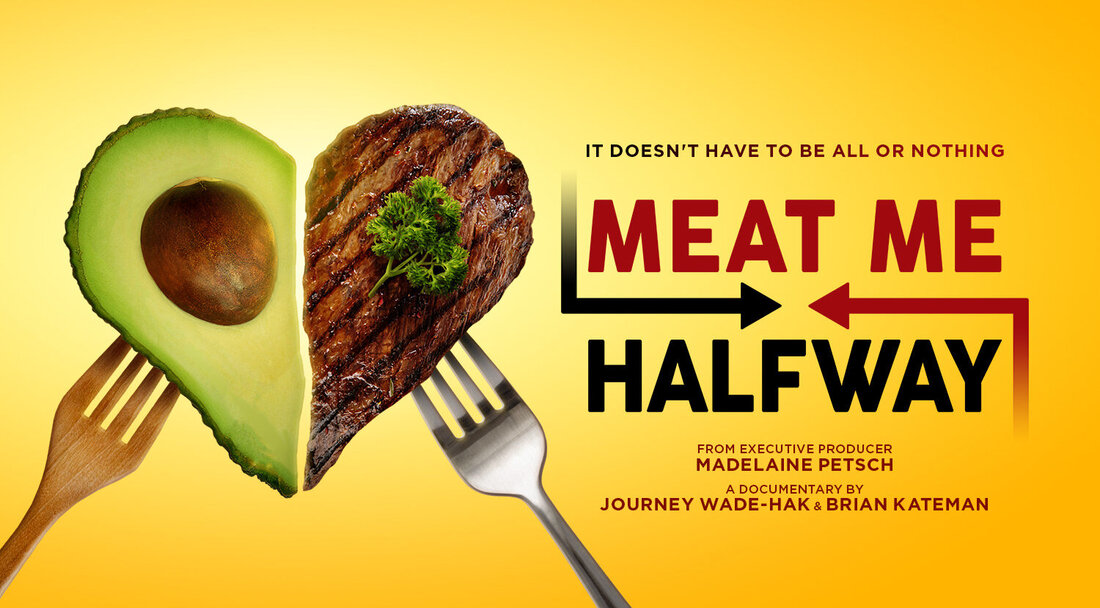|
The best documentaries don't come in with just a purpose, but with a question. Although "Meat Me Halfway" may be low-budget and without massive distribution, it arrives both purposefully and with a genuine interest - a thirst - for answers to the questions it's raising. This food documentary doesn't try to shove anything down the viewer's throat (pun intended), and it thrives on how accessible it's guide, Brian Kateman, is, and how passionately he approaches the idea that maybe there is middle-ground when it comes to eating a healthier diet. Middle-ground, you say? That's not exactly where people tend to meet these days. Even the effort to do so feels refreshing. Grade: A-Brian Kateman seems young - millennial age - and his inexperience as a filmmaker is endearing. Unlike others (think Michael Moore or Werner Herzog) who insert themselves into their documentary films, Kateman is unpolished and perhaps a bit unsure on camera, but this creates a real curiosity that would otherwise be lost with a more intimidating host. He's an author and the founder of the non-profit "Reducetarian Foundation," a group that advocates for a more common-sense approach to environmental issues and animal cruelty...although his views have caused more than an uproar in the animal rights community. The premise of having a "reducetarian" diet is this: It is a lot to ask, and frankly, unrealistic to ask millions of Americans to give up eating meat and dairy, to become Vegan. Food is too integral a part of many of our lives...to give up eggs, one person in the film says, is to have to give up your grandma's favorite cookie recipe, which has nostalgia importance baked right in. So instead of asking people to give up meat completely, Kateman asks us just to eat less of it. The benefits, he points out, are tremendous, if not in-line with what the Vegan or Animal Rights communities preach...but what he's asking may be far more achievable in the real world. "Meat Me Halfway" gives us a great first-hand look at the factory farm industry, and the moral consequences it presents. In the film, Kateman attends a rally where activists interrupt live pig deliveries to factory farms, stopping the trucks carrying the animals so that they can at least feed them some water through the small openings in the truck. Why can't animals be treated humanely? And why don't people seem to care where there food comes from, or how it was brought to their tables? But the magic of the film is in how it's structured. It starts off with Kateman on screen, basically telling us his beliefs. He then creates this dilemma as a personal one for him, in an eye-opening scene where he chats with his elderly parents about the food industry...let's just say that they have a different set of beliefs (mom admits to have never even tried eating an avocado). It's a scene that is relatable to much of the country, and it cuts deep: Not only do Kateman's parents think that Brian's theories are a bunch of bunk, but they represent a different generational viewpoint, and one that is all too common in our society where agreed upon facts are the rarest of all commodities. Once we find out what drives Brian, he brings in a group of interview subjects from his other flank...animal activists and the like who are appalled by this idea that it's "OK" to kill some pigs but not all of them. It's a rarity for a documentary to include intelligent criticism of its own theses within the documentary itself. It instantly lowers the guard of the audience to accept that although they may not agree with Kateman right away (or ever), he at least seems to be approaching these questions objectively and authentically. The facts as Kateman presents them is that even by reducing our meat intake ("just eat less meat" he says time and time again), it will make a tremendous impact on the environment and could help curb the rate of climate change globally. Not just that, but less meat would lead to less reliance on the giant factory farm industry, which in turn would lead to fewer animals being harmed, tortured, or worse. "Meat Me Halfway" educates without condescension, and offers some real insights. A die-hard Vegan and the guy who just ordered a double-bacon cheese burger at McDonald's may not have much in common when it comes to their eating habits, but both would be served well by watching Kateman's film. Is compromise even an option when two sides disagree so vehemently and deeply about their core values? To do nothing is not an option. Kateman's "reducetarian" approach may never catch on, but as Robert F. Kennedy once said, "Only those who dare to fail greatly can ever achieve greatly." "Meat Me Halfway" is a beacon of hope, an olive branch for the intellectual mind and a cry for help all lettuce-wrapped and served up for our consumption. The film may not change anyone's mind, but if anyone ever was to change their mind on this subject, this film is a good start. Grade: A- Genre: Documentary. Run Time: 1 hour 20 minutes. Not Rated. Co-Written and Co-Directed by Brian Kateman & Journey Wade-Hak. "Meat Me Halfway" is available on VOD on Tuesday, July 20th, 2021.
0 Comments
Leave a Reply. |
Looking for a specific movie or review?
Search Below: Categories
All
Archives
May 2024
|
tom santilli movie reviews
Tom Santilli is a professional film critic, TV personality, host and
the Executive Producer of Movie Show Plus.
He also is the featured film critic appearing on WXYZ Channel 7 Action News in Detroit,
and appeared weekly on FOX-2 in Detroit from 2016-2020.
Feel free to use the "search" below to find your favorite titles.
TOM'S GRADING SCALE:
B- and above: Thumbs Up
C+ or below: Thumbs Down
Currently Airing:Check Local Listings
|
For more information on Movie Show Plus, Email: |


 RSS Feed
RSS Feed
